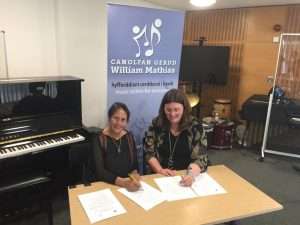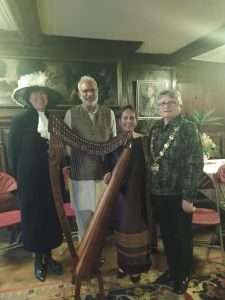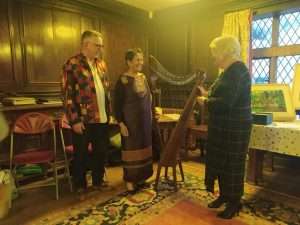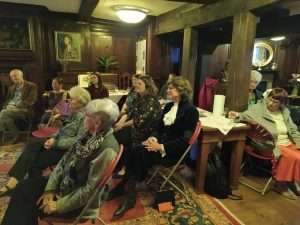From its inception, the University has had numerous partnerships for academic collaboration with institutions in the state, Northeast region and elsewhere in the country. The associations have been formalised by MoUs. MLCU also has formal partnerships with universities in Bangladesh, the Philippines and Canada. These association enable the mutual enhancement of academics, research, student exchange, faculty development and community outreach.
These partnerships generally fall into five categories:
Experiential Learning Theory (ELT) provides a holistic model of the learning process and a multilinear model of adult development, both of which are consistent with what we know about how people learn, grow, and develop. Experiential learning theory defines learning as the process whereby knowledge, skills, and values are created through the transformation of experience. Knowledge results from the combination of grasping and transforming experience. It is distinct from rote and didactic learning, in which the learner plays a comparatively passive role.
The University Grants Commission encourages the use of experiential learning stating that, “Learners must have ample scope to formulate their own queries and have multiple interpretations of knowledge through self-search and experiential learning.”
To emphasize the importance of experiential learning, MLCU encourages the broad use of experiential strategies and tools, recommending that at least half of the learning time be spent in experiential learning.
MLCU is privileged to have many partners in various corporate, service and professional sectors serving society with high commitment and expertise in different parts of the country. These organizations provide MLCU students with invaluable exposure and experience.
Hospitals and Healthcare Centres
- Apollo Hospitals, Main, Chennai, TN
- Apollo Hospital, Hyderabad, Andhra Pradesh
- Bansara Eye Centre, Shillong
- Bangalore Baptist Hospital, Bangalore
- Bethany Hospital, Shillong
- Children’s Hospital, Shillong
- CSI Mission General Hospital, Tamil Nadu
- CSI Somervell Memorial Medical College, Kerala
- CSI Rainy Multispecialty Hospital, Chennai, Tamil Nadu
- CSI Mission Hospital, Bangalore
- Christian Hospital, Rayagada District, Orissa
- Dr. Jeyasekharan Medical Trust Hospital, Tamil Nadu
- GudalurAdivasi Hospital, Tamil Nadu
- Jowai Civil Hopital, West Jaintia Hills, Meghalaya
- Nazareth Hospital, Shillong
- Nongstoin PHC, Meghalaya
- Shillong Civil Hospital, Meghalaya
- SANKER, Shillong
- Woodland Hospital, Shillong
Partners for Field Placements and Internships
Government Organizations
- District Rural Development Agency, Nagaland
- Department of Information Technology, Govt of Meghalaya
- Centre for Community Initiative, Manipur
- Directorate of Social Welfare, Meghalaya
- Directorate of Social Welfare, Nagaland
- Directorate of Employment & Craftsmen Training, Govt of Meghalaya
- Indian Council of Agricultural Research, Umiam, Meghalaya
- Integrated Basin Development & Livelihood Promotion Programme, Meghalaya
- Indian Council for Cultural Relations, Government of India
- Integrated Child Protection Scheme, Meghalaya
- Integrated Women and Child Development Centre, Manipur
- Incredible India, Shillong, Meghalaya
- Indian Council of Agricultural Research, Division of Social Sciences, Umiam, Meghalaya
- Meghalaya Energy Corporation Limited, UmiamRiBhoi District, Meghalaya
- Meghalaya Tourism Development Corporation, Shillong, Meghalaya
- Meghalaya Small Farmers’ Agri-Business Consortium, Shillong
- Meghalaya Basin Development Authority (MBDA)
- Meghalaya Rural Development Society, Meghalaya
- Meghalaya Energy Corporation Limited, Shillong
- Meghalaya Basin Development Authority, Shillong
- Meghalaya Health Insurance Scheme, DHS, Shillong
- Meghalaya State Vector Borne Disease Control Society, DHS, Shillong
- Mizoram Social Defense and Rehabilitation Board, Mizoram
- Nagaland State Social Welfare Board, Nagaland
- National Health Mission, Meghalaya
- North Eastern Region Community Resource Management Project (NERCOMP), Meghalaya
- North Eastern Electronic Power Corporation Limited (NEEPCO), Shillong
- Office of the Medical & Health Officer, I/C Dawki PHC, Meghalaya
- Office of Block Development Officer, Umsning C&RD Block, Ri-Bhoi District, Meghalaya
- Office of the Superintendent of Taxes, East Jaintia Hills District, Meghalaya
- Office of the Block Development Officer, Khliehriat C & RD Block, Meghalaya
- Office of District Urban Planner, West Jaintia Hills District, Meghalaya
- Power Grid Corporation of India, Shillong, Meghalaya
- State Rural Roads Development Agency, PMGSY, Govt of Meghalaya
- Soil and Water Conservation, Shillong, Meghalaya
- State Resource Centre for Women, Manipur
- Women’s Economic Development Society, Meghalaya
Corporate and Business Organizations
- Vanrap Tours & Travels, Shillong, Meghalaya
- Cement Manufacturing Company Limited, Lumshnong, Meghalaya
- Clara Tours, Shillong, Meghalaya
- Camp Fire Trails, Shillong, Meghalaya
- Cox & Kings, Kolkata, West Bengal
- Golden Arrows, Shillong, Meghalaya
- Housing Development Finance Corporation Bank (HDFC), Shillong
- Industrial Credit and Investment Corporation of India (ICICI), Shillong
- Khyriem Information Technology Essential Services (KITES), Shillong
- InTown Solutions, Shillong
- Life Insurance Corporation, Shillong
- Lafarge Umiam Mining Pvt. Ltd, Shillong
- Mahindra & Mahindra Automotive Products, Shillong, Meghalaya
- Makemytrip.com, Shillong, Meghalaya
- Mawmluh Cherra Cement Limited, Meghalaya
- Marboh Bamboo Products PVT LTD, Shillong
- Mercy Tours, Itanagar, Arunachal Pradesh
- Meghalaya Co-operative Apex Bank Ltd
- Media Infrastructure Pvt. Ltd, Shillong
- Modrina Auto Enterprises
- Mott Macdonald, Meghalaya
- Natasha Tours, Shillong, Meghalaya
- Oriental Insurance Company
- Pinewood Hotel, Shillong, Meghalaya
- Rani Motors, Shillong, Meghalaya
- RMG Video Collection, Jowai, Meghalaya
- Sundare Hotel, Tura, Meghalaya
- Social Forestry Department, Government of Meghalaya
- Shillong Cooperative Urban Bank Ltd (SCUB)
- State Bank of India, Shillong
- SS NET COM Private Limited, Shillong, Meghalaya
- Star Union Dai-Ichi Life Insurance Co. Ltd, Shillong
Sports
- Langsning Sports Club, Shillong
Educational Institutions
- Bethany Society, Meghalaya
- Bellefonte Community College, Shillong
- Bangalore Conservatory, Bangalore, Karnataka
- Buddha Vidyalaya Secondary School, Shillong
- Christian Medical Association of India (CMAI), Meghalaya
- Brookside Adventist Higher Secondary School, Shillong
- Dainty Buds School, Shillong
- Douglas Memorial School, Shillong
- Dinet Manik Syiem Memorial School, Shillong
- Eriben Presbyterian Secondary School, Nongthymmai, Shillong
- East End Chambers Secondary School, Shillong
- Garo Union Secondary School, Shillong
- Hill Crest Higher Secondary School, Shillong
- National Institute of Electronics & Information Technology (NIELIT), Shillong
- Jawahar Navodaya Vidyalaya, Mawphlang, Meghalaya
- KJP Synod Sepngi Higher Secondary School, West Khasi Hill District
- Laban Assamese Girls’ Higher Secondary School
- Laban Presbyterian Higher Secondary School, Shillong
- Malki Presbyterian Secondary School, Shillong
- Mawngap District Christian Multipurpose Higher Secondary School, East Khasi Hills, Meghalaya
- Mawlai Presbyterian College, Shillong, Meghalaya
- Mary Rice Centre for Special Education, Shillong, Meghalaya
- Mayfair Secondary School, Shillong, Meghalaya
- Nora Evalyn Secondary School, Shillong
- Nongtalang College, Nongtalang, West Khasi Hills
- Pila Rapsang Memorial Secondary School, Shillong
- Pearly Dew Higher Secondary School
- Rajiv Gandhi Indian Institute and Management
- Risa Secondary School, Shillong
- Royal Academy Secondary School, Shillong
- School and Centre for the Hearing Handicapped Children, Shillong, Meghalaya
- Shillong Public School, Shillong
- St. Edmund’s College, Shillong
- St. Xavier’s School, Shillong
- St. Peters School, Shillong
- Xavier Residential School, Shillong
Churches
- All Saints’ Cathedral
- Pohkseh Presbyterian Church, Shillong
- Ummulong Presbyterian Church, Ummulong, West Jaintia Hills District
NGOs
- Action North East Trust, Assam
- Bosco Integrated Development Society, Shillong
- DwarJingkyrmen, Meghalaya
- Grassroots, Meghalaya
- Hope Orphanage Trust, Mawkyrwat, Meghalaya
- Human Rights Law Network, Delhi
- Ebenezer Home, Nagaland
- Enfold, Bangalore
- Faith Foundation, Meghalaya
- HasiruDala, Bangalore
- International Fund for Agricultural Development (IFAD)
- Indian Youth Climate Network (IYCN)
- Jana UnnayanSamiti Tripura (JUST) Tripura
- Kripa Foundation
- KokborokTeiHukumu Mission, Tripura
- Lamjingshai, Meghalaya
- Manbha Foundation
- Mercy Home, Shillong
- NEIMA Orphanage, Laitmynrieng
- Network of Naga People, Nagaland
- New Hope Centre, Meghalaya
- North East Educational and Development Society (NEEDS)
- Prodigals Home, Nagaland
- Reach Shillong Ministry
- Shelter Home for Boys, Reach Shillong Ministries
- Shillong Society for the Performing Arts
- ShishuShikshaGhar, Meghalaya
- Tribal Health Initiative, Tamil Nadu
- Voluntary Health Association of Meghalaya (Female Injecting Drug Users), Meghalaya
- Voluntary Health Association of Meghalaya, Meghalaya
- William E Lewis Boys Home, Meghalaya
- World Vision, Meghalaya
Villages
- Lumsohpieng Village, Meghalaya
- Mawphlang Lyngdohship, East Khasi Hills District, Meghalaya
- Mawpun Kshaid Village, RiBhoi District, Meghalaya
- Nongtraw Village, Meghalaya
- Nongtymmai Village, Meghalaya
- Swer Village, East Khasi Hills, Meghalaya
- Umsawnengbri Village
- Umtung Village, East Khasi Hills, Meghalaya
Accreditation is the concept and process for the validation and recognition of educational courses taken at institutions other than colleges or universities for the purpose of transfer of credits towards degree programs at MLCU. Accreditation may be awarded for individual coursework or be awarded to an institution that conducts courses recognized by MLCU. Accreditation that is awarded to an institution may be formalized by an agreement with the University.
MLCU will consider transfer of credits for previous course work that has been taken by an applicant in the following categories or their equivalent:
- ITIs or polytechnics
- Community colleges
- Institutes set up by Trusts or Societies
- Any institute conducting courses recognized by a Government Ministry or statutory body
- The course work should have been taken after a Plus 2 certificate. In certain cases, the coursework could have been taken after the 10th standard, provided the course is recognized by a statutory body as equivalent to a Plus 2 certificate. Accreditation for course work taken after the 10th standard may also be granted by the University.
- Whether full-time or part-time, apart from the duration of the course, the number of hours/credits should be clearly indicated.
- The applicant should submit a request for credit transfer along with relevant certificates and transcripts.
- The application will be evaluated and considered for approval by the Dean, Academics.
- If considered necessary, an equivalency examination will be conducted.
- The University will ordinarily arrange a visit to the institution to ascertain the facilities, faculty and teaching program.
- The courses will be evaluated by a Board of Studies.
- If approved by the University, an agreement will be executed
- The ongoing academic monitoring and guidance shall be conducted by the Board of Studies with final approval by the appropriate academic committee of the University.
| Sl.No | Institute Name |
| 1 | Sampurna Institute of Advanced Studies (SIAS) renamed as “Montfort Institute of Advanced Studies” |
| 2 | Total Response to Alcohol & Drug Abuse-Institute of Social Sciences |
| 3 | CGLD School of Counselling |
| 4 | Sandhya Gatti Educators’ Trust (Teacher Ink) |
| 5 | Medisys Edutech Private Ltd |
| 6 | Sara Institute of Paramedical Sciences |
| 7 | Mason Philips Academy |
| 8 | Bansara Institute of Ophthalmic Sciences |
| 9 | International Academy of Trichology & Aesthetic Medicine |
| 10 | Shanti Bhawan Medical & Educational Trust |
| 11 | Global Centre for Capacity Building Organisation |
| 12 | Florida Montessori Centre |
| 13 | Society for Community Health Awareness Reseach and Action |
| 14 | Bethany Hospital |
As the first Christian University, MLCU has a mandate, mission and commitment to engage proactively with the Christian community, especially youth, Christian educational institutions and Christian organizations. To promote theological, religious and Christian studies and to align with the University’s mission statement, the University has associated with several Christian theological and other Christian institutions for awarding degrees, diplomas and certificates.
ACTIVE ASSOCIATED INSTITUTIONS
| Sl.No | Institute Name |
1 | Bethesda Khankho Institute, Manipur |
2 | The Counsellor’s Consortium, Chennai |
3 | Union Biblical Seminary, Pune |
4 | Academy for Christian Communication & Research (ACCR) (Doctoral Centre), Chennai |
5 | Southern Asia Christian College, Tamil Nadu |
6 | Indian Institute of Theological Studies, Pillangkatta, Ri-Bhoi |
7 | Development Associates Inititatives, New Delhi |
8 | Berachah Prophetic Ministeries, Chennai |
9 | Manipur Theological College, Manipur |
10 | Living Waters Institute of Theology, Kerala |
11 | UIM-Family Research Training Institute, Bangalore |
12 | Faith Theological College, Dimapur |
13 | Henry Martyn Institute, Hyderabad |
14 | Christian Counselling Centre, Tamil Nadu |
15 | Logos College, Dimapur |
16 | Bangalore Baptist Hospital, Bangalore |
17 | Indian Christian Camping Association, Bangalore |
18 | United College of Theology and Missions, Dimapur |
19 | Restoration Theological College, Manipur |
20 | Kairos Center for Theology and Leadership, Lucknow |
21 | United Theological College, Bangalore |
22 | Bethel New Life College, Bangalore |
23 | Saint Ignatius Theological Seminary, Kerala |
24 | Reformed School of Theology, Manipur |
25 | Evangelical College of Theology, Manipur |
26 | Himachal Bible College & Seminary,Palampur, Himachal Pradesh |
The rate of internationalization is growing rapidly with easier communication and travel. Universities across the world are already seeking to make the most of the possibilities this presents by forming global partnerships and fostering relationships with other institutions. In the globalized society we live in, international collaboration programs help by providing students with the ability to learn, work, and travel in an international capacity. With international exposure, students and faculty alike can enhance their ability to scrutinize, debate, and share experiences and global trends. These skills are essential for academic and scientific accomplishment especially in the development and implementation of research. Along with research opportunities and cross-cultural awareness, MLCU is also building this international relationship and academic collaborations with few universities. Through these collaborations, students can gain from international experiences including short-term training programmes, study tours, joint concerts, internship, and possible placements abroad. In terms of teaching, benefits include curriculum development and faculty training programme in collaboration with partner institutions.
List of International Collaborations:- Canolfan Gerdd William Mathias (Caernarfon, Wales)
 |
 |
 |
 |
- Panpacific University, McArthur Highway, San Vicente, Urdaneta City, Philippines
- Martin Luther University College (Luther), Waterloo, Canada
- Jagannath University, Dhaka, Bangladesh
- Notre Dame University Bangladesh, Dhaka
- King’s College of the Philippines, La Trinidad, Benguet,Philippines